How to Implement a Dialer in Your Call Center

At Drop Cowboy, we know that implementing a dialer in call centers can revolutionize operations.
A well-chosen dialer system boosts efficiency, improves agent productivity, and enhances customer experiences.
This guide will walk you through the process of selecting and implementing the right dialer for your call center, ensuring you make the most of this powerful technology.
What Are Call Center Dialers?
Call center dialers form the foundation of efficient outbound calling operations. The right dialer can transform a call center’s productivity. Let’s explore the three main types of dialers and their unique advantages.
Preview Dialers: Preparation is Key
Preview dialers offer agents a glimpse of customer information before connecting the call. This type enables personalized interactions, particularly useful for complex sales or support scenarios. Agents can review customer history, prepare talking points, and approach the call with confidence. While slower than other types, it excels in high-value calls where quality outweighs quantity.
Power Dialers: Steady and Strong
Power dialers automatically dial the next number once an agent completes a call. This maintains a consistent pace, eliminating idle time between calls. It strikes a balance, offering higher call volumes than preview dialers while still allowing agents brief preparation time. Power dialers suit most outbound campaigns, balancing efficiency with personalization.
Predictive Dialers: Maximum Efficiency
Predictive dialers use algorithms to anticipate agent availability and dial multiple numbers simultaneously. This type connects agents only to live answers, dramatically increasing talk time. A study by ContactBabel found that predictive dialers can increase agent talk time from 40 minutes per hour to 57 minutes (a 42.5% boost in productivity!).
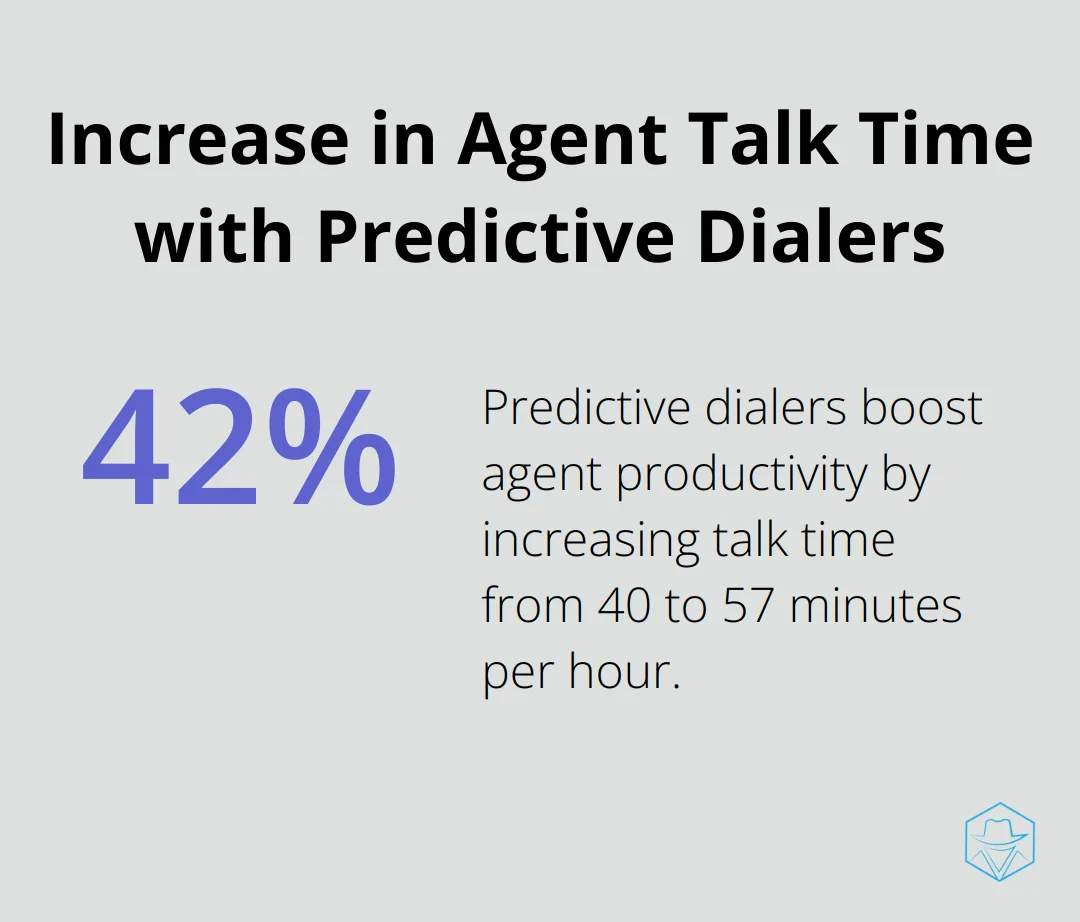
Key Features to Look For
When selecting a dialer system, consider these essential features:
- CRM Integration: Seamless data flow between your dialer and CRM maintains up-to-date customer information.
- Compliance Tools: With regulations like TCPA and GDPR, built-in compliance features are essential.
- Real-time Analytics: Systems that offer detailed reporting on key metrics (like connection rates and average handle time) provide valuable insights.
- Voicemail Detection: This feature saves agents time by automatically leaving pre-recorded messages for unanswered calls.
- Call Recording: This proves indispensable for quality assurance and training purposes.
The Impact of the Right Dialer
The right dialer can significantly impact your call center’s performance. A study by Forrester Research revealed that implementing an advanced dialer system can lead to a 300% increase in contact rates. This dramatic improvement underscores the importance of choosing the right dialer for your call center’s needs.
As we move forward, we’ll explore how to select the perfect dialer for your specific call center requirements, ensuring you harness the full potential of this powerful technology.
Selecting Your Ideal Call Center Dialer
Define Your Call Center Objectives
The first step in choosing the right dialer is to clarify your call center’s goals. Do you focus on high-volume outreach or complex, high-value interactions? Your objectives will guide your dialer selection. For large-scale marketing campaigns, a predictive dialer often proves most effective. However, if you handle sensitive customer service issues, a preview dialer might better suit your needs.
Assess Call Volume and Agent Capacity
Your daily call volume and team size play a crucial role in dialer selection. A small team handling a few hundred calls daily might benefit from a power dialer. Larger operations with thousands of daily calls could see significant gains with a predictive dialer. DMG Consulting reports that predictive dialers can increase agent productivity by 200-300% in high-volume environments (a statistic that underscores the importance of matching your dialer to your call center’s scale).
Prioritize Compliance Features
In today’s regulatory landscape, compliance isn’t optional-it’s a necessity. Look for dialers with built-in compliance features to help you navigate regulations like TCPA and GDPR. These tools can save you from potential legal headaches and costly fines.
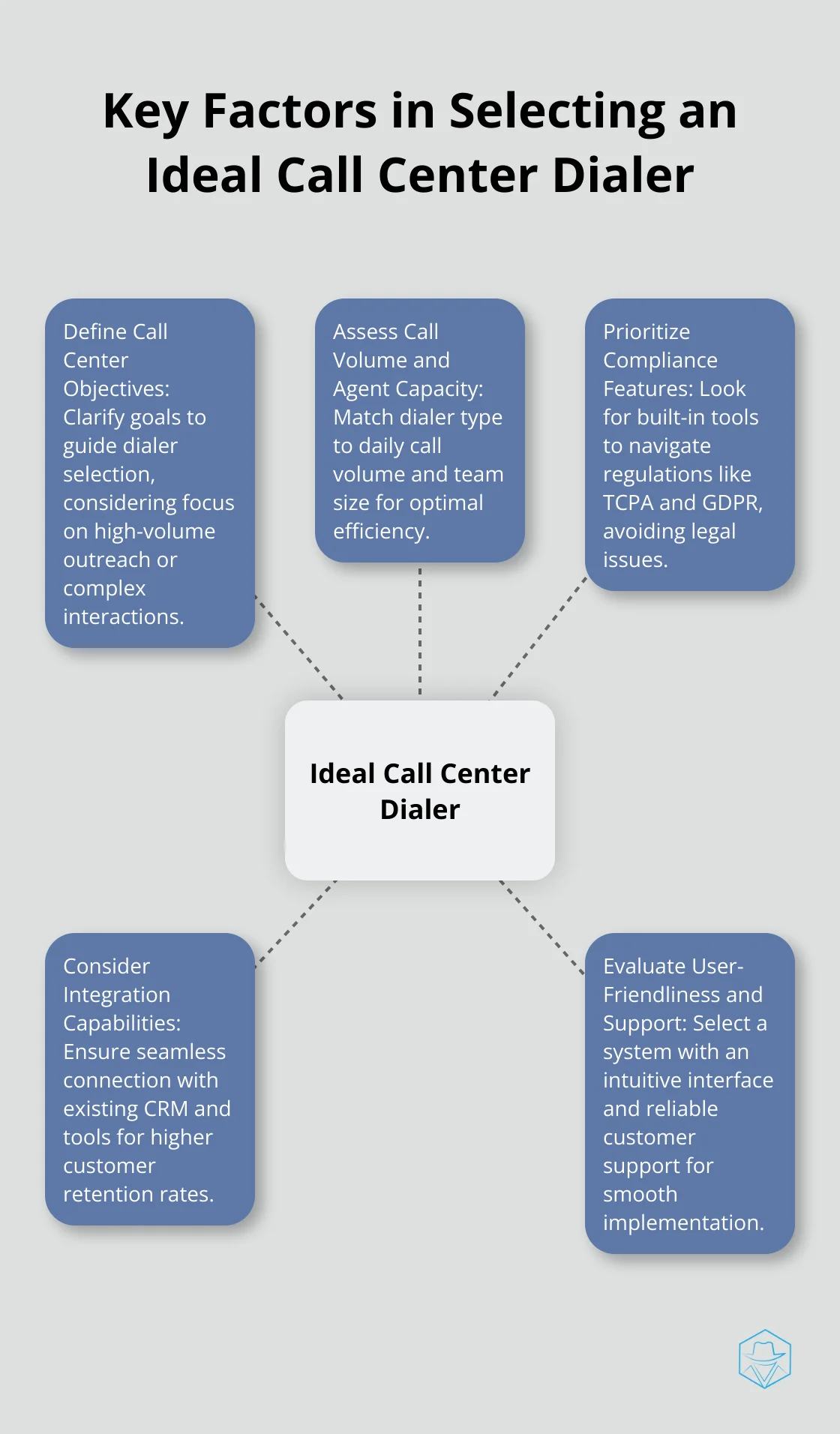
Consider Integration Capabilities
Your dialer should seamlessly connect with your existing CRM and other tools. This integration can lead to significant efficiency gains. Aberdeen Group found that companies with integrated systems saw a 36% higher customer retention rate compared to those without integration (a compelling reason to prioritize this feature in your selection process).
Evaluate User-Friendliness and Support
The ease of use and quality of support can make or break your dialer implementation. Try to select a system with an intuitive interface and comprehensive training resources. Additionally, ensure the provider offers reliable customer support to address any issues that may arise.
As you move forward in your dialer selection process, the next crucial step is to understand how to effectively implement your chosen system. Let’s explore the key steps to ensure a smooth transition and maximize the benefits of your new dialer technology.
How to Implement Your New Dialer System
Create a Detailed Implementation Plan
Start with the development of a comprehensive plan that outlines every aspect of the implementation process. This plan should include timelines, resource allocation, and specific milestones. A study by Project Management Institute shows that organizations with detailed implementation plans are 28% more likely to meet their project goals.
Your plan should address potential challenges and outline strategies to overcome them. For instance, if you transition from a manual dialing system to an automated one, factor in time for data migration and system integration.
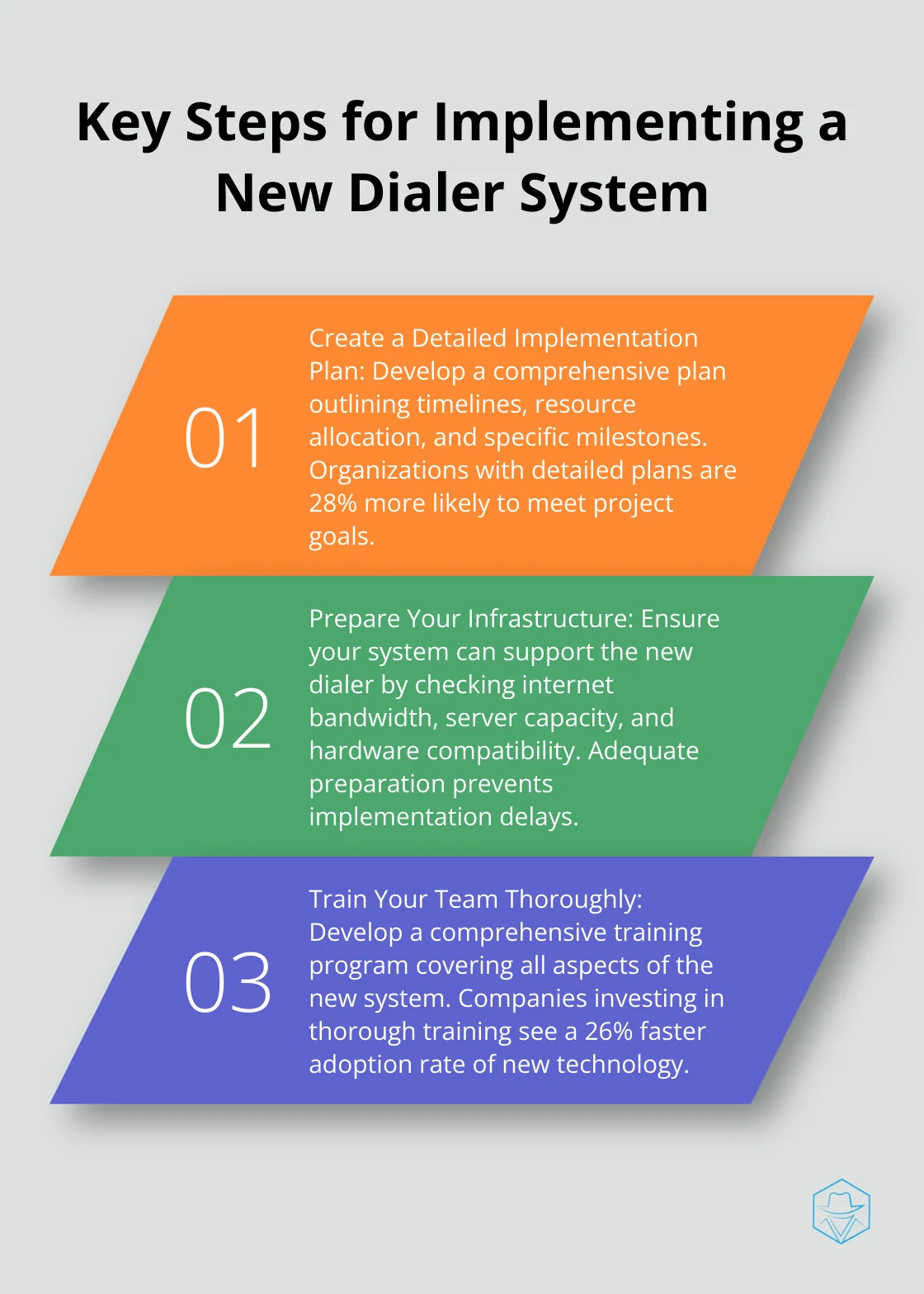
Prepare Your Infrastructure
Before installation, ensure your infrastructure can support the new dialer system. This includes checks of your internet bandwidth, server capacity, and hardware compatibility. A survey by TechValidate found that 67% of businesses experienced implementation delays due to inadequate infrastructure preparation.
If you opt for a cloud-based dialer, you’ll need less on-premise infrastructure. However, you’ll still need to ensure your internet connection is robust enough to handle the increased data flow.
Train Your Team Thoroughly
The success of your new dialer system depends on how well your team can use it. Develop a comprehensive training program that covers all aspects of the new system. A report by Training Industry indicates that companies that invest in thorough training during technology implementations see a 26% faster adoption rate.
Start with your supervisors and team leaders, then cascade the training down to all agents. Include hands-on practice sessions and create easily accessible reference materials. Plan for ongoing education as your team becomes more familiar with the system.
Test and Optimize
Once you install your system and train your team, conduct thorough testing before going live. Start with a small group of agents and gradually expand. Monitor key metrics like call connection rates, average handling time, and first-call resolution rates.
Use the insights from this testing phase to fine-tune your system settings and processes. A study by Aberdeen Group found that companies who rigorously test and optimize their new systems achieve 17% higher customer satisfaction rates within the first year of implementation.
Monitor and Adjust
After the initial implementation, continue to monitor the performance of your new dialer system. Try to identify areas for improvement and make necessary adjustments (this could include tweaking call scripts, adjusting dialing speeds, or refining agent training programs).
Regular performance reviews will help you maximize the benefits of your new system. Keep an open line of communication with your team to gather feedback and address any issues promptly.
Final Thoughts
A dialer in call centers transforms operations, boosts efficiency, and enhances customer interactions. The right system increases contact rates, reduces idle time, and improves overall performance. Successful implementation requires careful planning, infrastructure preparation, team training, and rigorous testing.
Continuous monitoring and optimization maximize the benefits of your new dialer system. Advanced communication solutions like Drop Cowboy can complement your dialer with features such as ringless voicemail and SMS integration. These tools further enhance outreach efforts and boost customer engagement.
Call center technology evolves rapidly, and implementing a dialer sets you ahead of the curve. This powerful tool drives improvements in efficiency, agent productivity, and customer satisfaction (when properly implemented). The future of your call center depends on harnessing the power of dialers today.
blog-dropcowboy-com
Related posts

July 1, 2025
Batch Dialer Pricing: Find the Best Value for You
Explore batch dialer pricing and uncover the best value options. Save money while maximizing efficiency with our detailed analysis and practical tips.

June 11, 2025
How to Choose the Best Jira Software Alternative
Explore top Jira Software alternatives with our guide. Evaluate features, pricing, and integrations to find the right fit for your project needs.
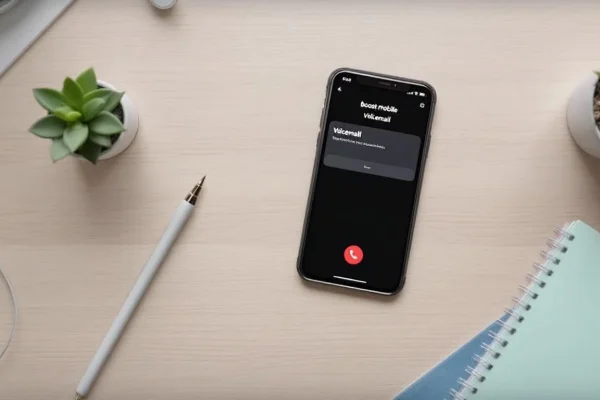
June 23, 2025
How to Access Voicemail on Boost Mobile App
Access Boost Mobile Voicemail App seamlessly. Follow our easy steps for quick set-up and enjoy instant control over your messages.
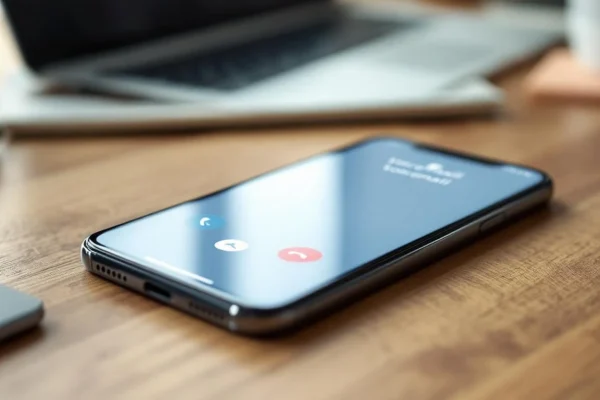
August 5, 2025
What does it mean when call goes straight to voicemail
Understand what it means when a call goes straight to voicemail. Discover common reasons and solutions to stay connected effectively.

July 20, 2025
Marketing Automation Best Practices: Drive Results
Enhance campaigns with marketing automation best practices. Boost engagement, streamline processes, and achieve effective results effortlessly.
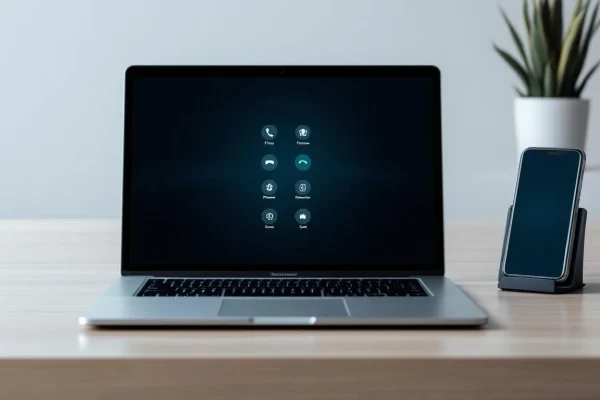
June 27, 2025
Phone Dialer for PC: Streamline Your Communication
Streamline calls with a phone dialer for PC. Enhance communication efficiency and discover tools to optimize your business connections.